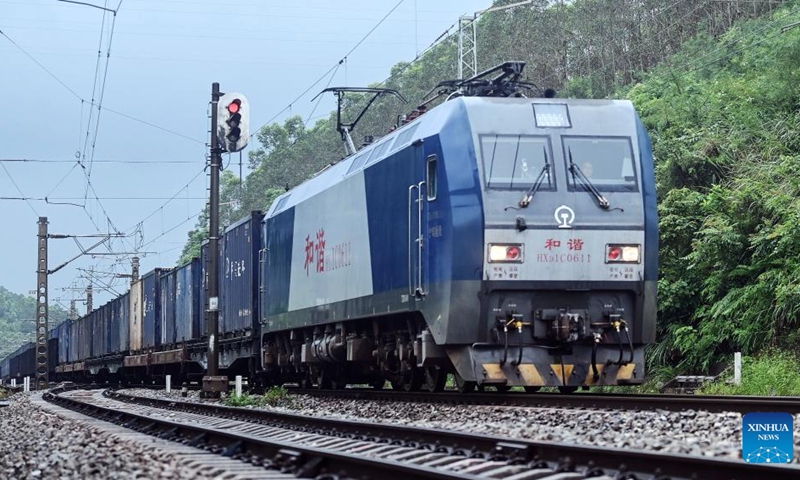China boosts international logistics with launch of Chongqing-Vientiane rail-road freight service

A train runs on the railway that constitutes part of the New International Land-Sea Trade Corridor on August 2, 2024. (Photo/Xinhua)
China's international logistics network took another step forward with the launch of the first Chongqing-Vientiane cross-border rail and road freight service focusing on autos and motorbikes under the New International Land-Sea Trade Corridor on Tuesday, China Media Group (CMG) reported.
Experts noted that this was a significant expansion of the international logistics corridor for Chongqing and China's western region's auto and motorcycle industries, injecting strong momentum into economic and trade ties between Southwest China's Chongqing Municipality and ASEAN countries.
The train, carrying 30 containers of motorcycles and parts valued at approximately 10 million yuan ($1.37 million), will travel along the China-Laos Railway, and is expected to reach Vientiane in five days, according to CMG.
Simultaneously, a cross-border road freight service carrying motorcycles, parts, and electromechanical products departed from the Nanpeng Highway Bonded Logistics Center (Type B) in Chongqing. The service is expected to arrive in Vientiane in four days, and complements the rail corridor, leveraging their combined strengths for enhanced connectivity.
This rail and cross-border road freight service forms an integral part of the New International Land-Sea Trade Corridor, seamlessly combining railway and road transport routes to establish a comprehensive logistics chain linking Chongqing, Vientiane in Laos, Bangkok in Thailand, and Selangor in Malaysia, Liang Haiming, dean of Hainan University Belt and Road Research Institute, told the Global Times on Tuesday.
He highlighted the freight service's significant role in boosting the international competitiveness of products from Chongqing and the Western region, emphasizing its flexibility in cargo transfer and cost efficiency. This initiative further strengthens China's international logistics network.
Meanwhile, Chongqing exported 2.214 million motorcycles, securing its position as the top exporter in China in the first half of this year, Chongqing Daily reported. Annual motorcycle production in the city is projected to surpass 6 million units, with a total output value exceeding 100 billion yuan, including more than 2 million electric motorcycles.
Liang added that cross-border transportation has broadened access to international markets, especially in Southeast Asia, for goods from Chongqing and surrounding regions, creating new opportunities for exporters. The rail and road freight services will also expand markets for Chongqing's automotive and motorcycle industries, enhancing international industrial collaboration, he said.
In the first 10 months of this year, China's trade volume through the New International Land-Sea Trade Corridor reached 1.15 trillion yuan ($158.1 billion), an 8.8 percent year-on-year increase, outpacing the national average growth rate by 3.6 percentage points, according to the General Administration of Customs (GAC).
GAC reported that the corridor's operational quality and efficiency continue to improve.
Starting from Chongqing, the New International Land-Sea Trade Corridor now links 126 countries and regions with 548 ports.
Photos
 Menglian in SW China's Yunnan produces over 80 percent of country's avocados
Menglian in SW China's Yunnan produces over 80 percent of country's avocados 37th Sun Island Int'l Snow Sculpture Expo begins trial operation in China's Harbin
37th Sun Island Int'l Snow Sculpture Expo begins trial operation in China's Harbin Explore an immersive cultural and creative products market at the Xinjiang Library
Explore an immersive cultural and creative products market at the Xinjiang Library Yuyuan Garden Lantern Fair to light up Shanghai on New Year's Day
Yuyuan Garden Lantern Fair to light up Shanghai on New Year's Day
Related Stories
- China-Laos Railway boosts growth of regional trade, tourism
- Chinese, Lao political parties hold 12th theory seminar in Xi'an
- Major China-Laos Railway port designated international sanitary ground crossing
- China-Laos Railway facilitates 43 million passenger trips in 3 years, acting as a new engine for regional economic development
- China-Laos Railway spurs regional economic growth
Copyright © 2024 People's Daily Online. All Rights Reserved.





